Normally, you can only sell single-user subscriptions on a membership website. However, you may want to sell group memberships so that businesses can easily add all their team members to the same account.
Over the years, we’ve sold different types of memberships to users. We’ve learned that you can use a membership plugin like MemberPress to sell group subscriptions to corporate teams easily. This makes the process smoother, and you don’t have to rely on developers to create custom memberships for your site.
In this article, we will show you how to easily sell group memberships in WordPress for corporate teams.

Why Create Group Memberships in WordPress?
Selling membership subscriptions is a popular way to make money online blogging with WordPress. However, businesses may want to buy memberships for multiple people at once, such as an entire team or department.
By offering group memberships, you can make it easier for companies to purchase your product licenses in bulk. It also means the account administrator can easily add or remove licenses as needed, such as when a new employee joins the company.
Group memberships aren’t just useful for corporate teams.
Volunteer groups and nonprofit organizations, church groups, or even families may find it easier to buy a group membership rather than multiple individual subscriptions. Teachers might also use group memberships to set up a virtual classroom for groups of students.
That being said, let’s take a look at how to sell group memberships in a WordPress website.
Setting Up Group Memberships in WordPress for Corporate Teams
The easiest way to sell group memberships is by using the MemberPress plugin with the Corporate Accounts add-on.
MemberPress is the best WordPress membership plugin on the market and allows you to create group memberships with an unlimited number of sub-accounts.
It even allows members to re-sell these subscriptions. For example, let’s say you run a membership site with healthy eating plans and online yoga classes.
Personal trainers or health and fitness experts can buy a corporate membership from your site and then sell access to their own clients.
For more information, you can see our complete MemberPress review.
First, you need to install and activate the MemberPress plugin. For more details, see our step-by-step guide on how to install a WordPress plugin.
Note: You’ll need a MemberPress Plus account or higher in order to install the Corporate Accounts add-on.
Upon activation, go to MemberPress » Settings in the WordPress dashboard and enter your license key.
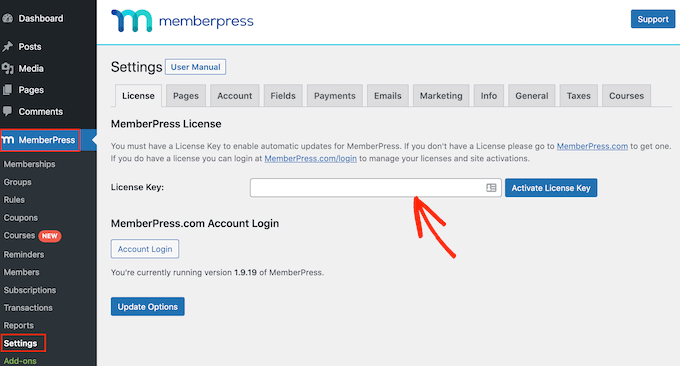
You’ll find this information under your account on the MemberPress website. It’s also in the email you got when you purchased MemberPress.
After entering this information, click on ‘Activate License Key.’
Add a Payment Method
Next, you need to set up at least one payment gateway so you can easily accept credit card payments for your group memberships.
MemberPress Pro supports PayPal, Stripe, and Authorize.net. To add one of these payment gateways, simply click on the ‘Payments’ tab and then click on ‘Add Payment Method.’
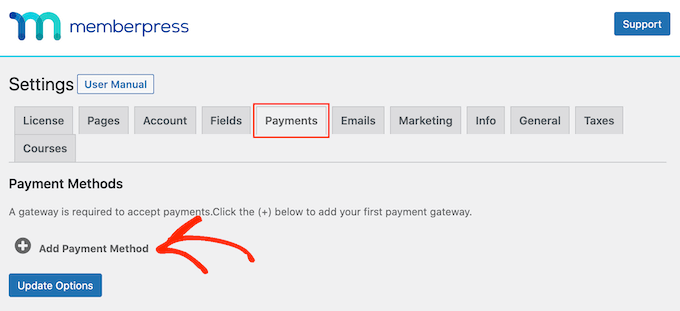
The MemberPress Plus plan supports PayPal and Stripe payments. You can also use Authorize.net by purchasing their Pro plan.
Simply open the ‘Gateway’ dropdown and select the gateway you want to use.
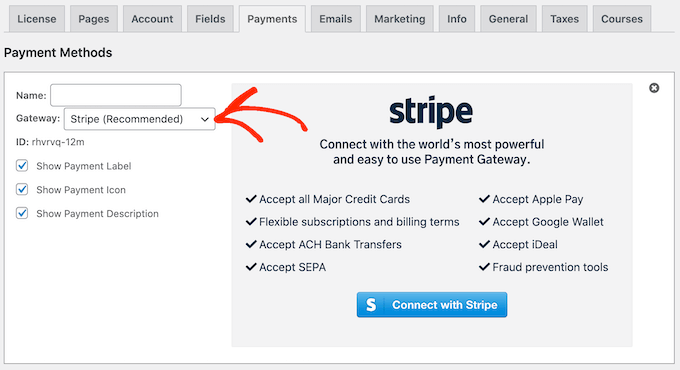
MemberPress will now show all the settings you need to configure before you can use this payment gateway.
Each gateway has different settings, for example in the following image we’re adding PayPal payments to WordPress.
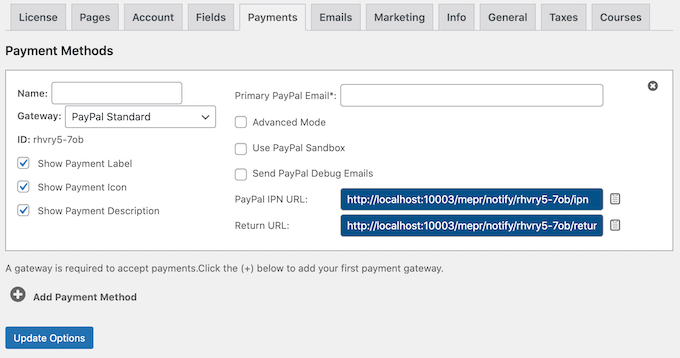
Once you’ve configured the gateway, click on ‘Update Options’ to save your settings.
You may be able to get more sales and improve the customer experience by allowing users to choose a payment method. To add multiple gateways to your site, simply click on Add Payment Method and then repeat the same process described above.
Install the Corporates Account Add-on
After adding one or more gateways, it’s time to enable the corporate membership features.
To do that, go to MemberPress » Add-ons and click on the ‘Install Add-on’ button next to the Corporate Accounts add-on.
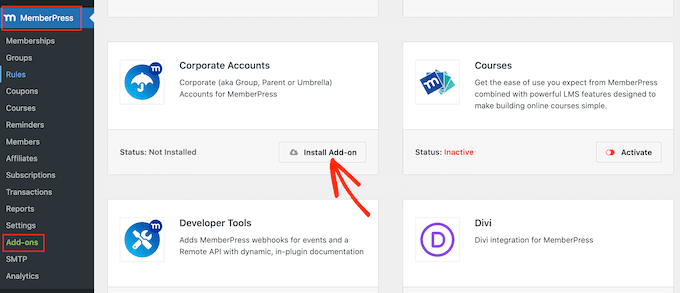
When it appears, click on the ‘Activate’ button to make the add-on live.
Create Your Membership Levels
After that, it’s time to create a corporate membership level by going to the MemberPress » Memberships page. Here, click on ‘Add New.’
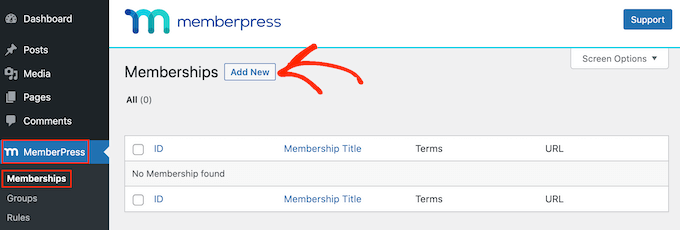
To start, type a title for the corporate membership plan. This will appear in your WordPress admin area and will also be visible to the people who visit your site, so it’s a good idea to use something descriptive.
With that done, set a price for the group membership by typing into the ‘Price’ field.
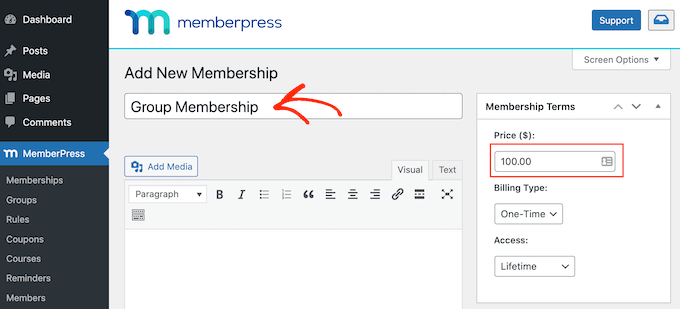
Next, use the ‘Billing Type’ dropdown to create the billing cycle. For example, you might charge a one-time fee for lifetime access or set up a recurring monthly subscription.
If you choose ‘Recurring’ then you can use the settings to charge members on a weekly, monthly, quarterly, or annual basis.
In the following image, we’re charging $100 every 6 months.
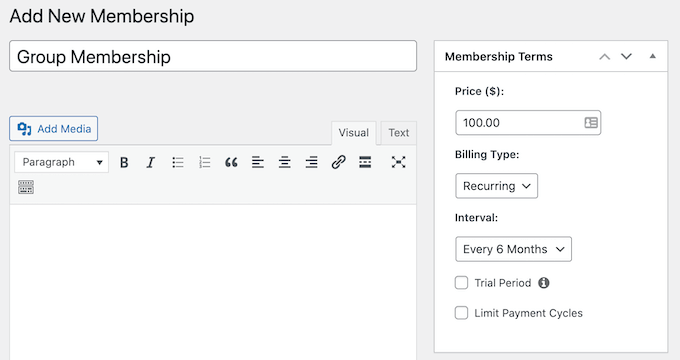
By accepting recurring payments in WordPress, you can automate the billing process. This can save you a ton of time and generally leads to fewer payment delays and errors. It also means you don’t have to send invoices manually.
After choosing a billing type, there might be some extra settings you need to configure such as choosing whether to offer a free trial subscription in WordPress. Most of these settings are fairly straightforward, so you can look through them and make any changes you want.
When you’re happy with how the membership level is set up, scroll to the ‘Membership Options’ box and click on the ‘Advanced’ tab. Here, check the box next to ‘Subscribers to this Membership are Corporate Accounts.’
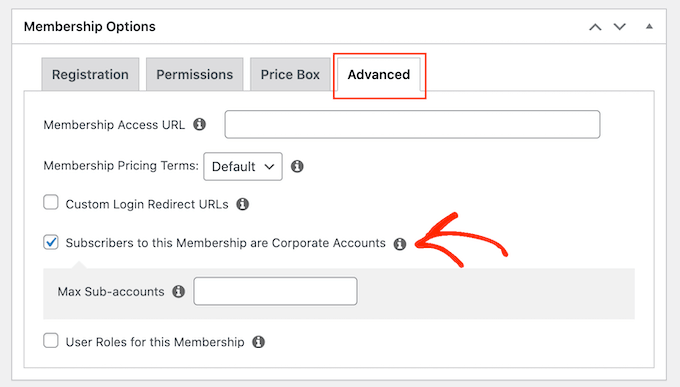
After that, you’ll see a new field where you can set the maximum number of sub-accounts that the account owner can add to their subscription.
When someone purchases a corporate membership subscription, they’ll see a ‘Sub Accounts’ link on their Account page, as you can see in the following image.
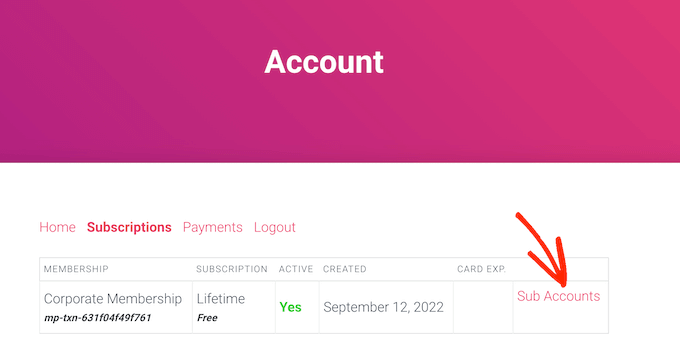
If they click the link, then they’ll see how many sub-accounts they have left.
They can add people to the group account by typing in information such as the person’s first name, last name, and email address.
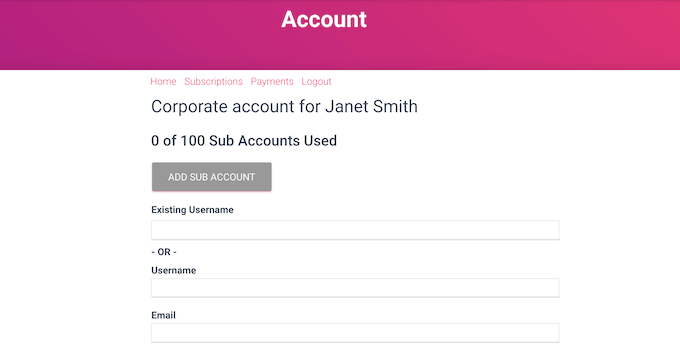
By default, account owners can create an unlimited number of sub-accounts. However, you’ll typically want to set a limit, as this stops people from abusing their account.
To do this, simply type a number into the ‘Max Sub-Accounts’ field.
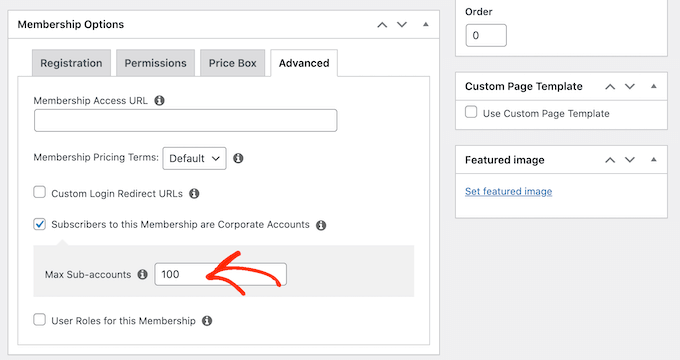
There are some more settings you can look through, but this is enough to create a basic corporate membership subscription.
When you’re happy with how the plan is set up, go ahead and click on the ‘Publish’ button.
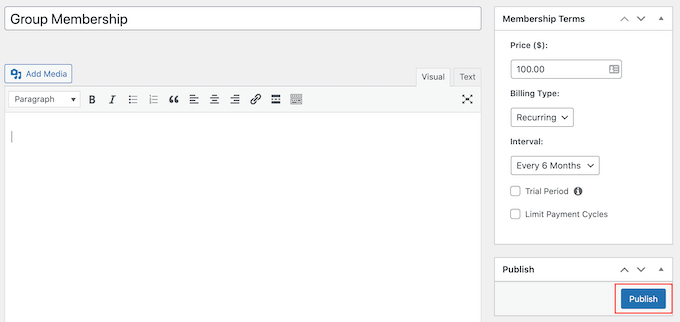
To create more membership levels, simply follow the same process described above. For example, you might create a Bronze account that allows people to add 1-100 members and a Silver account that allows 100+ sub-accounts.
Restricting Content for the Corporate Team Members to Access
With that done, you’re ready to restrict your content so only people with the right subscription can access it. You do this by creating membership rules.
For example, you might lock all child pages of a ‘Corporate Membership’ parent page, or restrict access to all posts that have the ‘corporate’ category or tag. You can then assign this content to your group membership, so only people with a subscription can access it.
To create a rule, go to MemberPress » Rules in the WordPress dashboard. Then, simply click the ‘Add New’ button.
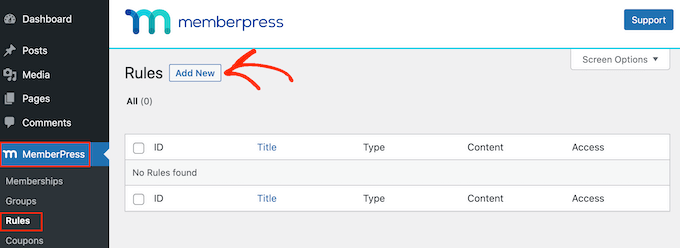
You can restrict access in lots of different ways using the ‘Content & Access’ settings.
For example, you might make a single page members-only.
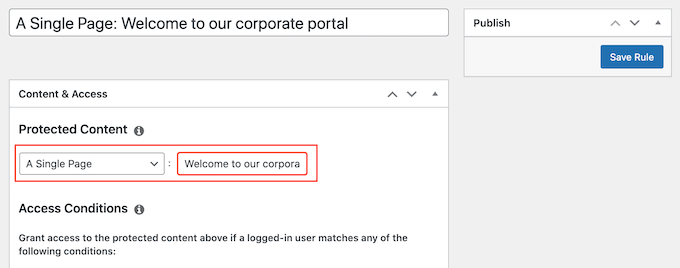
You can also restrict access to entire groups of content using categories and tags.
As an example, we’re going to restrict access to all content that has the ‘Corporate’ tag. If you need more detailed instructions, then please see our step-by-step guide on how to add categories and tags for WordPress pages.
To restrict access to a specific tag, open the ‘Protected Content’ dropdown and choose ‘All Content Tagged.’ Then, type in the tag that you want to use.
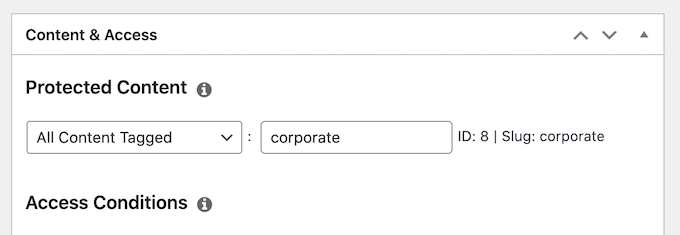
After that, open the ‘Access Conditions’ dropdown and select ‘Membership.’
You can then open the second dropdown and choose the corporate membership level you created earlier.
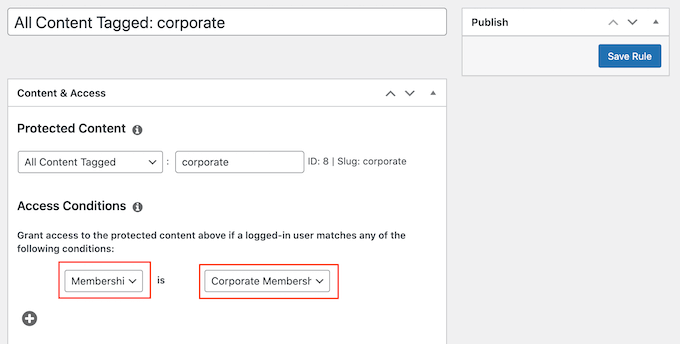
There are lots of other settings you can try, including showing a preview to non-members. For example, you might show the post excerpt to people who don’t have a corporate membership. This can encourage visitors to buy a subscription so they can see the restricted content.
To learn more about creating advanced membership rules, please see our ultimate guide to creating a WordPress membership site.
When you’re happy with how the rule is set up, scroll to the top of the screen and click on ‘Save Rule.’ To create more content restriction rules, simply repeat the same process described above.
We hope this article helped you learn how to sell group memberships in WordPress for corporate teams. You may also want to see our guide on how to run members-only events in WordPress and our expert pick of the best WordPress paywall plugins.
If you liked this article, then please subscribe to our YouTube Channel for WordPress video tutorials. You can also find us on Twitter and Facebook.





Christine Contini
This was very helpful. Thanks a bunch, guys!!!
WPBeginner Support
Glad our guide was helpful
Admin